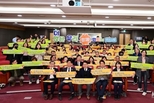
Newsnomics AJAY ANGELINA reporter |
South Korean government is deploying 100 Filipino household helpers in Seoul going to start their work in early August announced by the Ministry of Employment and labor.
South Korea, by issuing E-9 visa to Filipino domestic workers is going to expand domestic services like child care and housekeeping that were limited to the agriculture, fisheries, manufacturing, construction sectors, food serving in Korean restaurants, hotels and resorts, forestry and mining.
South Korea has completed discussions with the Philippine government in regard of Korea’s pilot program for Filipino domestic workers willing to work in Seoul” said the Ministry of Employment and labor.
On the other hand, the Philippine government is planning to post a job opening for 100 Filipino domestic workers willing to work in Seoul until the end of this month. The Philippine’s government will accept applications only from those carrying certificates related to child care from the Technical Education and Skills Develop ment Authority of the Philippines.
As Filipino workers willing to work as a domestic helpers should be of age 24 years, will go through the initial and follow-up interviews, health checkups, and the Korean language proficiency tests, they will be allowed to enter South Korea around July, said the South Korean Labor Ministry.
After entering in South Korea, the domestic Philippine workers will undergo four weeks language program and Korean cultural training will be supervised by the Human Resources Development Service of Korea (HRDK) and the workers will be able to start work from August.
The Republic of Korea plans to recruit around 100 foreign domestic workers in 2023 using the E-9 visa on a pilot basis, in the “Pilot Plan for Non-professional Employment Visa (E-9) for Foreign Domestic Workers” stated by the Ministry of Employment and Labor earlier last year.
The E-9 Non-professional Employment visa is allowed to the citizens of Bangladesh, Cambodia, China, East Timor (Timor-Leste), Indonesia, Kyrgyzstan, Laos, Mongolia, Myanmar, Nepal, Pakistan, Philippines, Sri Lanka, Thailand, Uzbekistan and Vietnam.
E-9 visa holders are restricted to work in the agriculture, fisheries, manufacturing, construction sectors, food serving in Korean restaurants, hotels and resorts, forestry and mining.
Initially, the South Korean government’s pilot program will be limited to Seoul, and will only accept Filipino nationals.
The ministry is considering offering a dormitory for Filipino household workers in collaboration with the Seoul Metropolitan Government.
Seoul Metropolitan Government plans to provide a budget of 150 million won ($117,000) in regard to cover the additional costs of housing, transportation, and interpretation.
“It will not be easy for them to look for a place to live here, so we are thinking about offering them accommodation in which they can live together,” a ministry official said.
Further, South Korean Labor Ministry plans to fine-tune the pilot program policy after the six-month.










